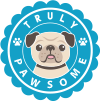By Patty Dobson
Our pups rely on us to provide them with the nourishing food they need, and keeping their diet both nutritious and balanced is key in keeping your pup healthy, happy, and in a state of optimal well-being. A properly nourished and appropriately energized pup starts by considering your pup’s size, activity level, lifestyle, and eating habits. This serves as a helpful guide to determine your pup’s nutrition and correct caloric needs, as well as what foods and snacks to choose. On the opposite end of the healthy eating spectrum occupies overeating and being overweight, which cause conditions, such as disease, decreased mobility, and declining health and happiness.
Foods available are aimed at specific stages of your pup’s life, from puppyhood to senior living, and many options offered cater to special nutritional needs, from formulations that are allergen free to those catering to conditions, such as heart disease and diabetes. When choosing your pup’s food, make sure it contains a suitable amount of carbohydrates, proteins, fats, vitamins and minerals based on his needs. According to the National Research Council, at least 10% of a pup’s daily diet (by weight) should be protein and 5.5% should be fat. Frequently, dog foods have higher amounts than those because dogs may not be able to digest all of the nutrients his food.
To get a sense of why we need each piece of the nutritional puzzle, let’s explore the importance of each:
Carbs – Gives us and our pups energy, benefits our heart and promotes a healthy digestive system by aiding in digestion and elimination. Carbohydrates are the body's main source of fuel. When you take in food, your body breaks down its sugars and starches and absorbs them into your bloodstream.
Proteins – One of the most important nutrients needed for a pup’s well-being, to grow and thrive. Protein’s essential to the building, maintenance, and repair of body tissue such as the skin, hair, internal organs, and muscle. Proteins are the major components of our immune system and hormones and are necessary to repair damaged cells and make new ones.
Fat – “Good fats” help with the absorption of vitamins and minerals, and mono and polysaturated fats can help with lowering LDL cholesterol (aka bad cholesterol) levels, keeping the heart healthy. Keeping a proper balance of omega-6 and omega-3 fatty acids in food helps to benefit skin, hair, and can have an anti-inflammatory effect on the skin and body.
Vitamins & Minerals – Derived from plant and animal sources, they’re vital to the health of your pup, helping to maintain healthy cellular function and keeping his immune, circulatory, nervous and endocrine systems, metabolism, and hormones balanced, so they can function optimally. They also help to promote eye, heart, skin, teeth, bone, and organ health, while helping to prevent disease.
Water –Always have fresh, clean water available. Like us, our pup’s cells are made up of mostly water and dehydration hinders his body from functioning properly. A dog can lose all of its fat and half of its protein and survive, but a 10% loss of water can cause organ shutdown, serious illness, and death. Water transports vital nutrients to cells, flushes out toxins, lubricates joints and spinal discs, hydrates cells and tissues in the body, and aids in waste elimination. While pet food contains some moisture, pup’s require sufficient hydration through cool, fresh, clean water. Generally, a dog needs at least one ounce of water for each pound of body weight per day. If your dog isn’t drinking an adequate amount of water, seek a vet’s advice. Monitoring water intake is especially important if he’s recovering from diarrhea, vomiting or other illnesses.
